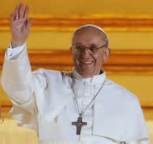The Pope's Story
Pope Francis I is the 266th Pope of our Roman Catholic Church. He was elected as Pope on March 13, 2013 and installed on the Feast of St. Joseph, March 19, 2013. Throughout his life, both as an individual and a religious leader, he has been known for his humility, his concern for the poor, and his commitment to interfaith relations as a way to build bridges between people of all backgrounds and beliefs.
Jorge Mario Bergoglio was born December 17, 1936, in Buenos Aires. He grew up in Barrio de Flores, a working-class neighborhood. His father was a railway worker, his mother a homemaker. As a youth, the pope studied in public schools and in high school obtained a technical certification as a chemist.
From a young age, he knew he would become a priest. Amalia Damonte, who grew up in the pope's neighborhood, reportedly was briefly the object of his affections. Damonte, who still lives in the same neighborhood, has said in interviews that when they were 12, Pope Francis said that if he could not marry her, he would become a priest.
When the pope was 21, he became gravely ill with severe pneumonia and had his right lung partially removed. The Vatican spokesman, Jesuit Father Federico Lombardi, has confirmed this, noting that it is "not a handicap" in the pope's life.
In 1958, Pope Francis entered the novitiate of the Society of Jesus and two years later he took his first vows as a Jesuit. In 1963, on returning to Buenos Aires, he studied philosophy at San Miguel Seminary. Between 1964 and 1965, he taught literature and psychology at a Jesuit secondary school in Santa Fe, Argentina, and in 1966, he taught at the prestigious Colegio del Salvador secondary school in Buenos Aires.
In 1967, he returned to his theological studies and was ordained a priest December 13, 1969. After his perpetual profession as a Jesuit in 1973, he became master of novices at San Miguel. Later that same year, he was elected superior of the Jesuit province of Argentina and Uruguay.
From 1979 to 1985, Pope Francis served as rector and theology teacher at Colegio Maximo before heading to Germany to finalize his doctoral thesis.
In May 1992, he was appointed auxiliary bishop of Buenos Aires. He was one of three auxiliaries and he kept a low profile, spending most of his time caring for the Catholic university, counseling priests ,and preaching and hearing confessions.
On June 3, 1997, he was named coadjutor archbishop. He was installed as the new archbishop of Buenos Aires on February 28, 1998. As archbishop he was known simply as "Father Jorge," and he adopted the attitude that the church belongs in the street. He built chapels and missions in poor areas and sent seminarians to serve them. He spoke out often against injustice, such as the treatment of migrant workers from neighboring countries and those lured into the sex trade, and against social issues such as abortion and same-sex marriage.
In 2001, he was elevated to cardinal, and later that year he served as an official of the Synod of Bishops at the Vatican.
